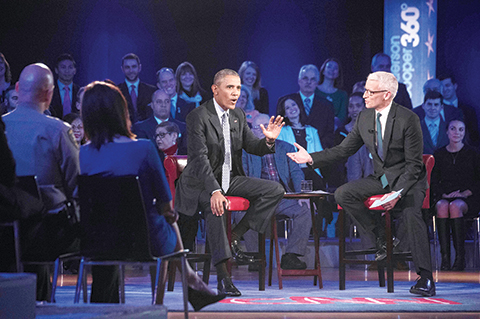 US President Barack Obama speaks at a town hall meeting with CNN's Anderson Cooper (R) on reducing gun violence at George Mason University in Fairfax, Virginia, on January 7, 2016. Obama announced limited measures two days ago to tackle rampant US gun violence and called on Americans to punish lawmakers who oppose more meaningful reforms. AFP PHOTO/NICHOLAS KAMM
US President Barack Obama speaks at a town hall meeting with CNN's Anderson Cooper (R) on reducing gun violence at George Mason University in Fairfax, Virginia, on January 7, 2016. Obama announced limited measures two days ago to tackle rampant US gun violence and called on Americans to punish lawmakers who oppose more meaningful reforms. AFP PHOTO/NICHOLAS KAMM
FAIRFAX, Virginia: US President Barack Obama mocked conspiracy theorists and tore into the National Rifle Association for pushing "imaginary fiction", as he described his plans to tighten gun control rules as modest first steps toward tackling gun violence in America. In a primetime, televised town hall meeting Thursday, Obama fielded tough questions from high-profile gun control opponents and supporters alike, often answering with sympathy and without confrontation as he tried to reassure Americans there is a middle ground on a fiercely divisive issue.
But Obama didn't hold back when asked by CNN moderator Anderson Cooper about the notion that the federal government - and Obama in particular - wants to seize all firearms as a precursor to imposing martial law. He blamed that notion on the NRA and like-minded groups that convince its members that "somebody's going to come grab your guns". "Yes, that is a conspiracy," Obama said. "I'm only going to be here for another year. When would I have started on this enterprise?" Obama defended his support for the constitutional right to gun ownership while arguing it was consistent with his efforts to curb mass shootings. He said the NRA refused to acknowledge the government's responsibility to make legal products safer, citing seatbelts and child-proof medicine bottles as examples.
Taking the stage at George Mason University, Obama accused the NRA of refusing to participate in the town hall despite having its headquarters nearby. "Since this is a main reason they exist, you'd think that they'd be prepared to have a debate with the president," Obama said. NRA spokesman Andrew Arulanandam said beforehand that the group saw "no reason to participate in a public relations spectacle orchestrated by the White House." Several NRA members were in the audience for the event, which was organized and hosted by CNN. And the NRA pushed back on Twitter in real time, noting at one point "none of the president's orders would have stopped any of the recent mass shootings".
The White House has sought to portray the NRA, the nation's largest gun group, as possessing a disproportionate influence over lawmakers that has prevented new gun laws despite polls that show broad US support for measures like universal background checks. Last year, following a series of mass shootings, Obama pledged to "politicize" the issue in an attempt to level the playing field for gun control supporters.
The American Firearms Retailers Association, another lobby group that represents gun dealers, did participate Thursday. Asked how business had been since Obama took office, Kris Jacob, vice president of the group, replied: "It's been busy." "There's a very serious concern in this country about personal security," he added.
Opposition
Obama's actions on guns have drawn major attention in the presidential campaign, with the Democratic candidates backing Obama and the Republicans unanimously voicing opposition. Donald Trump, addressing a rally in Vermont just as Obama was holding the town hall, said he would eliminate gun-free zones in schools on his first day if elected to the White House. "You know what a gun-free zone is for a sicko? That's bait," Trump told the crowd.
Obama's broadside against the NRA came two days after his unveiling of a package of executive actions aimed at keeping guns from people who shouldn't have them. The centerpiece is new federal guidance that seeks to clarify who is "in the business" of selling firearms, triggering a requirement to get a license and conduct background checks on all prospective buyers.
The plan has drawn intense criticism from gun rights groups that have accused the president of trampling on the Second Amendment and railroading Congress by taking action on his own without new laws. Just after his 2012 re-election, Obama pushed hard for a bipartisan gun control bill that collapsed in the Senate, ending any realistic prospects for a legislative solution in the near term.
The town hall featured several well-known figures in the gun debate. Former Rep Gabrielle Giffords, who was shot in 2011, stood as her husband, Mark Kelly, asked Obama about confiscation theories. Taya Kyle, whose late husband was depicted in the film "American Sniper", asked the president about why he doesn't highlight falling murder rates. Cleo Pendleton, whose daughter was shot and killed near Obama's Chicago home, asked about his proposals to stop gun trafficking across state lines. Kimberly Corban, an NRA supporter, told Obama she'd been raped by an intruder and now feels that owning a gun "seems like my basic responsibility as a parent ... I refuse to let that happen again."
Ahead of the town hall, Obama put political candidates on notice that he would refuse to support or campaign for anyone who "does not support common-sense gun reform" - including Democrats. All the candidates running for the Democratic presidential nomination support stricter gun laws, so Obama's declaration in a New York Times op-ed isn't likely to have an impact on the race to replace him. Instead, it appeared aimed at Democratic congressional candidates from competitive districts who might want Obama's support on the campaign trail this year. - AP
.jpg)



